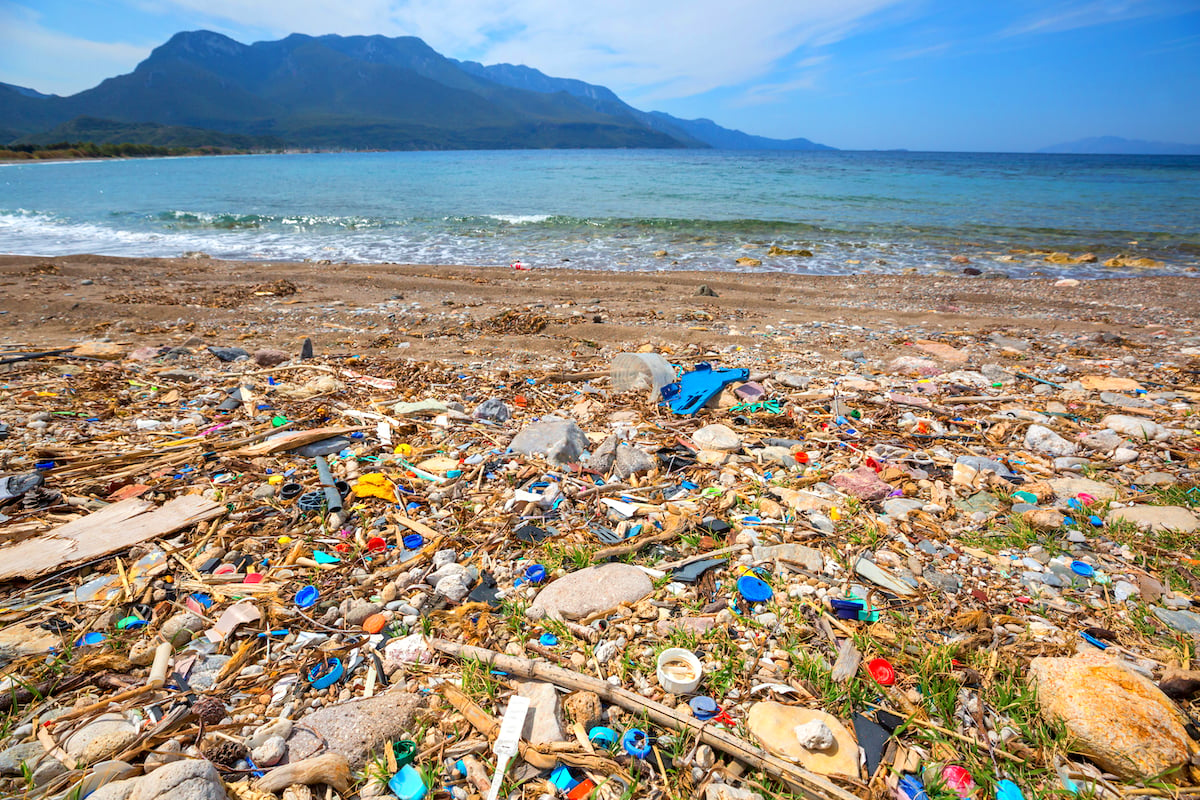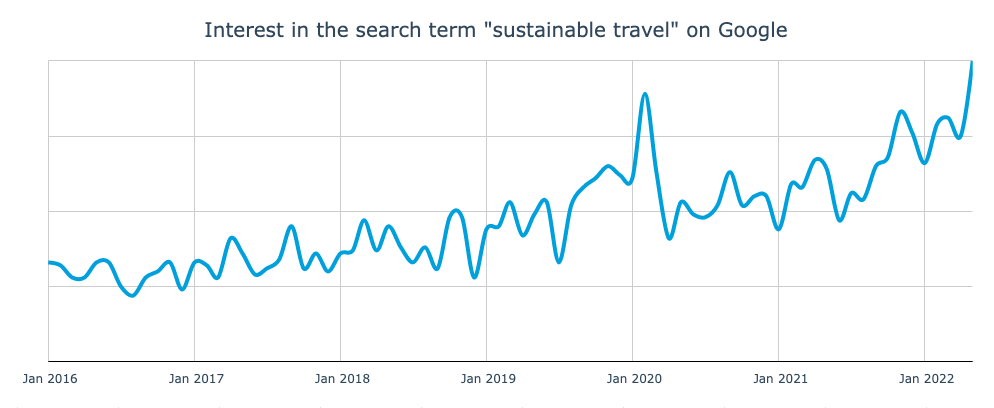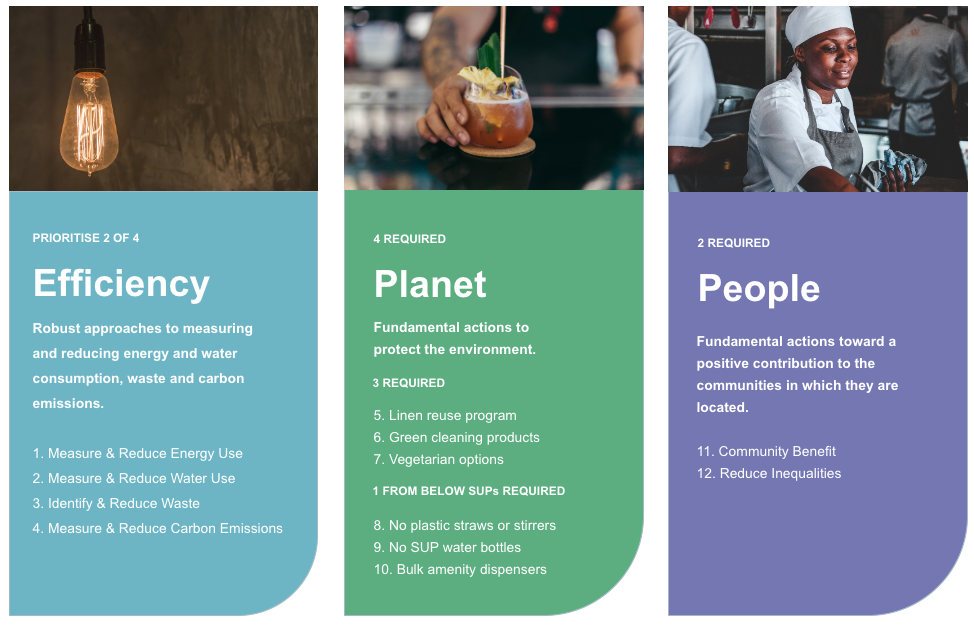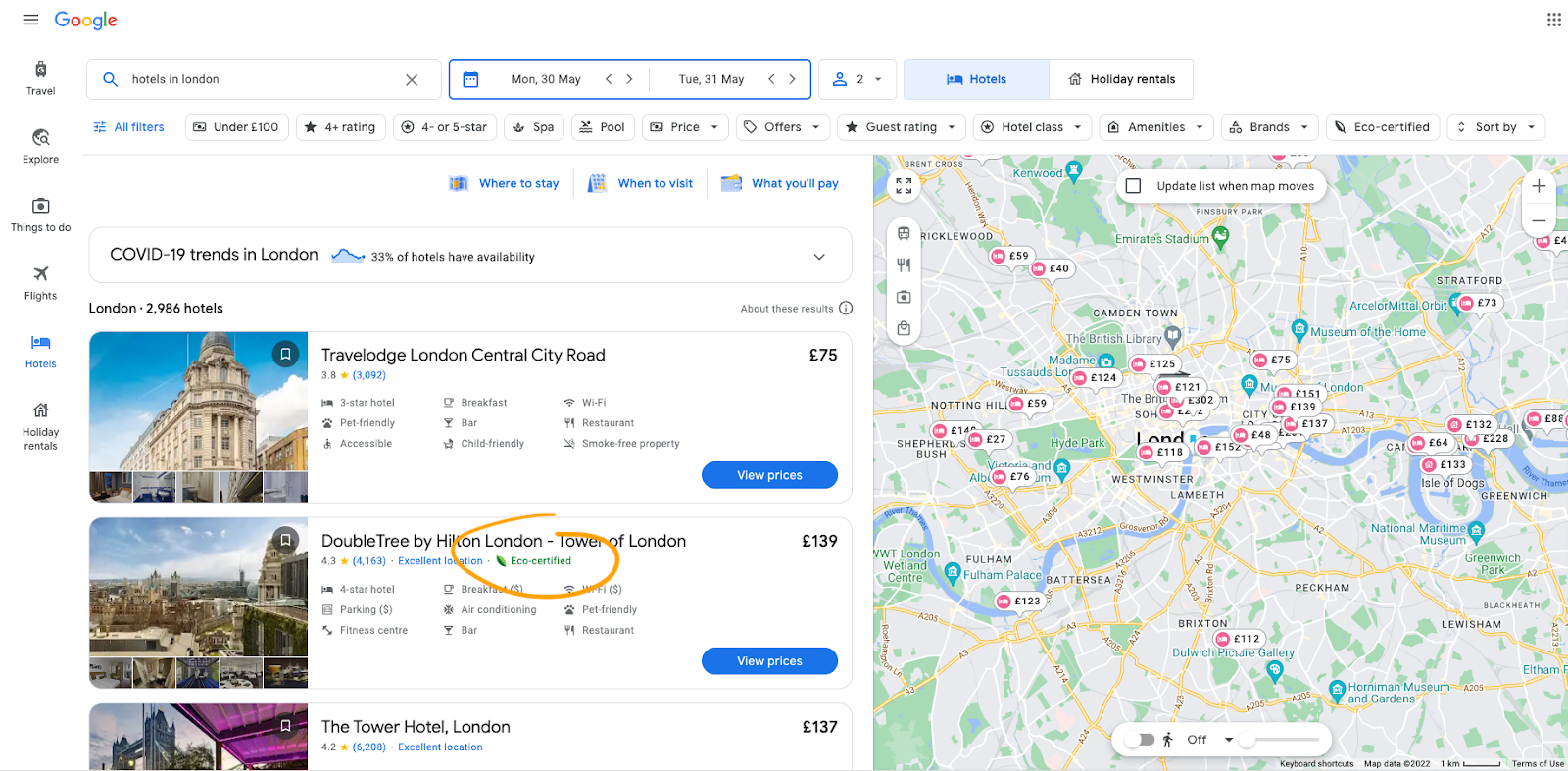Consumer demand for travel is rebounding after the pandemic, and along with this rebound there is an additional demand for more sustainable travel options. In June 2021, 61% of travellers told Booking.com that the pandemic has made them want to travel more sustainably in the future, and in April 2022, 70% of travellers said they would be more likely to choose sustainable accommodation, even if they weren't specifically looking for it.

But, when you have a 24/7 hospitality business to run, getting started with sustainability can seem like a complicated, costly and time-consuming hurdle…
Thankfully, The World Travel and Tourism Council (WTTC) is an industry body that understands the day-to-day reality of being a busy hotelier. Their new initiative, the Hotel Sustainability Basics, provides guidance on sustainability for accommodation providers that is achievable, actionable, and accessible for almost any business.
We chatted with Christopher Imbsen, Director of Sustainability at the WTTC to find out more about what the Hotel Sustainability Basics entail, and why now is the time to pay attention to them.
Answers have been edited for brevity and clarity
There are already an overwhelming number of certifications, organisations, declarations and publications about sustainability in hospitality. Why did you decide to launch yet another initiative?
The criteria area is indeed a busy one and a competitive one, but there is a space right there at that initial stage for hotels that don't know what to do or are struggling in terms of resources or knowledge to actually get onto the sustainability bandwagon, so to speak. In all transparency, at the start I was a little bit sceptical, I thought, “Really? There must be enough criteria systems out there?” But, through our really extensive engagement following the initial request to develop the Hotel Sustainability Basics, we realised that there was a space for “the basics”.
We could have called it something sexy like “sustainable stays” or something like that, but we thought that that wouldn't be earnest – we really wanted to call this what it is, it’s the basics. We wanted to develop criteria that all hotels can and should be doing as a bare minimum, and to raise the level of what the non-negotiables are – you can be more sustainable, but at least be doing this.
Although these aren't the most ambitious sustainability initiatives out there, through a non-threatening, simple, kind of hand-holding process, we can get more people on board. That was the idea: to increase the catchment.
How easy are these criteria for hotels of varying sizes and in different locations to achieve?
There might be one or two businesses out there in the world that can’t meet all the criteria, but the idea is to get as many hotels on board as possible, while not compromising on sustainability measures that actually have an impact.
I think some of the measurement ones are easier than people would imagine to begin with, and we do point to the key tools that people can use. If they are able to run a business, then they probably can use those tools as well. Plastics can be complicated, we refer to a report on eliminating single use plastics and where we have these decision trees that you can use to figure out whether it actually does make sense for you. It may be that some are not able to do it, there may be cost issues, there may be other trade-offs in place that mean that moving away from single use plastics, for example, is not a possibility.
At the summit where we launched the Hotel Sustainability Basics, we immediately managed to get on board a bunch of other supporters, apart from the 11 hotel groups that initially pushed this. I think with all the supporters and the properties that they represent, 50 000 properties is a very conservative estimate for the number that we are covering now, and it's been very encouraging to hear positive feedback from all these associations. The Zurich Hotel Association, for example, is launching The Basics along with their own verification system and they said that this was exactly what they needed, that they were looking at schemes and needed something they knew everyone could get on board with.
 Interest in sustainable travel continues rise [Source]
Interest in sustainable travel continues rise [Source]
How did you go about deciding what criteria to include as the basics, the non-negotiables?
This was a very ambitious undertaking. To come to an agreement with the global hotel industry on what the basics are was an extremely complicated activity. Water in Scotland is quite a different thing from water in Egypt, for example. So we went through a process involving many rounds of consultations with the hotels that make up the Sustainable Hospitality Alliance – and that was a crucial one because they take these matters very seriously – and of course we consulted with the eleven large brands that initially supported The Basics, and then with the wider community and key players such as the Global Sustainable Tourism Council, Google and Booking.com.
We mapped out all these criteria to make sure that they don't exist in isolation, because this is positioned as the basics, but also positioned as transitional. That's why we give the three year timeframe and eight criteria to start with, because we want people to gain confidence. You know, once you do a few measurements you think “Oh, if I can measure that I can probably measure this as well”. Take your time, take those three years, and once you’re done with those three years move on to getting verified by GSTC or Green Key or EarthCheck or whatever else is out there, because all of these things that you’re already now building lead into all of those others anyway.
We also had to distil the list of criteria to 12, we thought we needed something simple that people could wrap their heads around. It’s like that quote by Mark Twain: “I’m sorry for writing you a long letter, I didn't have the time to write you a short one”. I think the big effort here was actually distilling it down to 12. That was really complicated and took a long time, but we got there, and I think that we can now say, with confidence, that we have created a global basic sustainability criteria by the industry and for the industry. They have come to an agreement around these.
What elements of sustainability do the criteria cover?
The 12 criteria are divided into three sections. There are the “efficiency” ones that are about measuring and reducing. Because we are working in a global context, we can’t be specific about quantities to reduce, so it’s about measure and reduce. Then we have the “planet” ones, as we call them, those are around green housekeeping and linen reuse and a few single-use plastic ones. Lastly, we have the social ones, which were very difficult to decide upon, as you can imagine, especially in a global context. There was quite a bit of feedback to just remove this section, but we thought that if we are going to call this sustainability then we have to keep those in there as well, so we have two social indicators.
To give you an example of the kind of thinking that we went through with the measure and reduce ones specifically, we suggest that you measure and reduce carbon energy, water and waste, but with waste we say identify and reduce, because actually measuring the waste in a hotel is very complicated, and that’s what all the hotels said to us. So, we want people to at least start identifying and demonstrating how you’re reducing, where those sources are. If you want to, once you’re done with this, you can move on to a more complicated scheme where they are asking you to meet certain targets, but the point of this is getting everyone on board.
 Image courtesy WTTC
Image courtesy WTTC
Why is now, just as the industry is coming back from the effects of Covid, the time to start thinking about sustainability?
2020 was an absolutely disastrous year, but towards the end of 2020, WTTC members came to us and said “listen, we’ve got to get the sustainability piece right”. Sustainability has become, if not the top priority, equal top priority within the organisation since Covid. So, we are responding to an industry demand, it was hotels that brought this to us.
We've established a task force of really committed sustainability directors, a committee led by CEOs of powerhouse member companies that are really empowering us to do a lot of work in sustainability now. This is something that we probably wouldn't have been able to do before, because I think that there’s a general understanding that many of these issues, including zoonotic diseases like Covid, come from a lack of sustainability, and people are getting that.
Travel is extremely reliant on ecosystem services, and is particularly vulnerable to the impact of zoonotic diseases, the risks of climate change and so on – if you expand your view to even just a little past the short term, tackling all of this makes absolute financial sense.
Obviously a lot of companies are struggling with the very, very short term, but there’s enough of a demand for sustainability guidance from those that aren’t, so The Basics should exist anyway. Secondly, there are actually earnings and savings to be made by going sustainable on many fronts. We know we won’t convince everyone, but we did our best to make something that balances what is meaningful with what is inclusive.
We are also hoping that by generating a bit of a movement around this people will see that it is actually possible, that there are even financial savings to be had, and they won’t want to be left behind. To have a conversation in your company about diversity and inclusion doesn’t cost you any money; to reduce single use plastics can be complicated, but that’s what consumers want, so you should respond to that demand; governments may have been moving slowly on this, but they are going to be clamping down, so get ahead of the curve, that’s always less costly; and you could actually save some money if you reduce your energy and your water consumption.
 Google introduced an eco-certified badge to hotel listings in September 2021, allowing travellers to easily make more sustainable choices.
Google introduced an eco-certified badge to hotel listings in September 2021, allowing travellers to easily make more sustainable choices.
The hospitality industry is a massive consumer of a vast variety of products. Do you think hoteliers could make an impact if they “vote with their wallets” and choose suppliers who are themselves committed to sustainability?
We produced a report last year that offers guidance for how various industries within travel and tourism can reach net zero carbon emission goals, and part of that was looking at where their main climate emissions lie, and these are analogous to impacts in general. So, for airlines and cruises, which are fossil fuel consumers, it’s all scope 1 emissions, so they need to focus on that, but with hotels, most of their emissions are produced in what are called scope 2 and scope 3.
Scope 3 is supply chain emissions, and the problem is that they are not well defined, but ultimately everyone is going to be responsible for them, so we have got to get to grips with what this means. For hotels, OTAs and light tour operators, most of their impacts are in the supply chain. So the call to action there, especially among the larger more powerful consumers, is to start working with the supply chain. That's the best way to address their impacts and their emissions, by having those conversations. But yes, of course, we firmly believe that “friendly,” constructive pressure on the supply chain is a crucial way for many industries in tourism to help reach our collective sustainability goals.
So, for example, if a hotel restaurant is using disposable plastic containers for takeaway meals, should they rather switch to a supplier that offers a more sustainable option like cardboard?
First, I would say you should take it to your supplier and ask if they can provide you with a more sustainable alternative, and if they can’t, then consider sourcing differently. If you just move to someone else, the first supplier will continue providing plastic to whoever else will buy it, but if you say, “We actually want cardboard, because people want more sustainable options”, they might think, “Oh, maybe we should get into this”. We want to start to positively influence suppliers – rather than just cutting suppliers out, first give them a chance to do the right thing, and then look at what alternatives there are as a second recourse in case that doesn't work.
How can hoteliers go about choosing the most sustainable options when looking not just at the product itself but the whole supply chain, for example transportation costs?
There are efforts out there that exist to calculate carbon emissions per product, but this is not an easy thing at all, this is a massive challenge – we haven’t solved the scope 3 issue yet because we don’t have all the information we need. There needs to be much more carbon calculation with regards to how products are generated and what that means, as it’s only through transparency that consumers can make better decisions. At the moment, people are kind of fumbling in the dark, that is true. It’s a huge challenge not only finding out what and where the emissions are, but also defining the boundaries of what you actually are responsible for or not. But this is far outside of the scope of the basics!
So, to get back to the basics then, are there any quick wins? What are the first steps?
The first step is to register on the website and download the toolkit, which explains what the criteria are, and how to implement them. There’s also a document called “How to Get Started,” which gives some very basic advice on what they can do to begin with. The idea is that all of these are quick wins. Don’t start one this year and one next year, try to do all eight – it should be feasible. This is all very hands on and simple advice, so we hope that The Basics will be a good start.
Do you have any other plans for the Hotel Sustainability Basics? What’s next for the basics and for sustainability in the industry?
This initiative could have existed just as it is, which is an open resource, but we have felt quite a bit of demand to develop a verification scheme so that those who want to be validated can be, and we have a number of third party verifiers who have reached out to us and are keen to support us in implementing this. So, we are planning to have a light-touch remote verification scheme, ideally launched by the end of the year. These verifiers will also be able to hand-hold and provide guidance. So you either submit all your documents and get the verification, or you submit the documents and get advice if you need it.
Additionally, by collecting information on what is holding people back from achieving these sustainability criteria, these non-negotiables, we will have very valuable data that we can take to local councils and governments and say “your hotels aren’t able to do this because of X and Y,” and that can be a really powerful advocacy tool.
We are also asking hotels to fill in the Green Lodging Trends Report survey, which was run by Greenview, who were one of our partners in developing the Hotel Sustainability Basics. All the information we collect through that survey will also serve for precisely this purpose – identifying where the hurdles are, and once we have that information we can see how we might wish to address it. In return for taking the time to fill out the survey, hotels get a customised benchmark report.
The Basics include the recommendation that “Guest feedback is obtained and reviewed to improve hotel’s sustainability offerings.” Do you think guests who visit sustainable hotels might have a better experience?
I do think that you feel better when you're drinking something through an aluminium or cardboard straw and not a plastic straw, and you know you’re not just leaving waste lying around everywhere, or when you're using recycled water for your toilets, or that there’s community involvement in the hotel and in the services provided – these are all feel-good things for guests.
There may be some issues where, at five-star hotels for example, people expect to have their towels changed every day or sometimes even twice a day, so they might be needing to compromise a little on the services they usually expect.
I do think hotels need to take note of the feedback that comes in and pay attention to what the guests are telling you they want to see more of.
Do you have any sustainability initiatives at your hotel? Do your guests know about them? Do they prefer more sustainable travel options? Find out how your guests feel about the subject by adding a sustainability section to your guest surveys.




